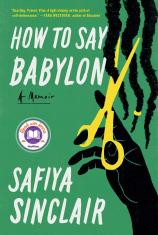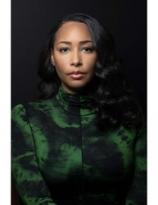Excerpt
Excerpt
How to Say Babylon: A Memoir

Prologue
My Life had stood—a Loaded Gun—
—EMILY DICKINSON
BEHIND THE VEIL OF TREES, night’s voices shimmered. I stood on the veranda of my family’s home in Bickersteth in the small hours after midnight, on the lonely cusp of womanhood, searching for the sea. My birthplace, a half speck of coastline hidden by the tangled forest below, was now twenty miles away in the dark. When I was a girl, my mother had taught me to read the waves of her seaside as closely as a poem. There was nothing broken that the sea couldn’t fix, she always said. But from this hillside town fenced in by a battalion of mountains, our sea was only an idea in the distance. I pressed my face into the air’s chill and listened.
Out here was the bread and backbone of our country. The thick Jamaican countryside where our first slave rebellion was born. These mountains tumbling far inland had always been our sanctuary, hillsides of limestone softened over time, pockets of caves resembling cockpits overgrown with brush, offering both refuge and stronghold for the enslaved who had escaped. Echoes of runaways still hung in the air of the deepest caves, where Maroon warriors had ambushed English soldiers who could not navigate the terrain. The English would shout commands to each other, only to hear their own voices bellowing back at them through the maze of hollows, distorted as through a dark warble of glass, until they were driven away in madness, unable to face themselves. Now more than two centuries later, I felt the chattering night wearing me mad, a cold shiver running down my bones. A girl, unable to face herself.
The countryside had always belonged to my father. Cloistered amidst towering blue mahoes and primeval ferns, this is where he was born. Where he first communed with Jah, roaring back at the thunder. Where he first called himself Rasta. Where I would watch the men in my family grow mighty while the women shrunk. Where tonight, after years of diminishment under his shadow, I refused to shrink anymore. At nineteen years old, all my fear had finally given way to fire. I rebuked my father for the first time, which drove him from the house in a blaze of fury. What would happen to me once he returned, I did not know. As my siblings and mother slept inside, frightened and exhausted by the evening’s calamity, I paced the dark veranda, trying to read the faint slip of horizon for what was to become of me.
As I stared past the black crop of bush into the night, the eyes of something unseen looked back. Something sinister. A slow mist coiled in the valley below. The air shook across the street, by the standpipe where we filled our buckets with water when the pipes in our house ran dry. There, emerging from the long grasses, was a woman in white. The woman appeared like a birdcatcher spider ambling out of its massive web. Her face, numb and smudged away, appeared to me as my own face. I stood unmoving, terrified as I watched this vision of my gray self glide down the hill toward me, cowed and voiceless in that long, white dress. Her head was bowed, her dreadlocks wrapped in a white scarf atop her head, walking silently under the gaze of a Rastaman. All the rage that I burned with earlier that night had been smothered out of her. She cooked and cleaned and demurred to her man, bringing girlchild after girlchild into this world who cooked and cleaned and demurred to her man. To be the humbled wife of a Rastaman. Ordinary and unselfed. Her voice and vices not her own. This was the future my father was building for me. I squeezed the cold rail of the veranda. I understood then that I needed to cut that woman’s throat. Needed to chop her down, right out of me.
There, I could see where these fraught years of my adolescence had been leading—with each step I had taken into womanhood, the greater my hunger for independence. The more of this world I had discovered, the more I rejected the cage my father had built for me. There, in her frayed outline, I saw it, finally: If I were to forge my own path, to be free to make my own version of her, I had to leave this place. If I were to ever break free of this life, I had to run. But how would I ever find my way out? How would I know where to begin? Here, in the same hills that had made my father, now sprung the seed of my own rebellion.
I was being called to listen to what the land already knew. To unwind the hours that led to this catastrophic night, I had to exorcise the ghost of its making; I had to first understand my father and the history of our family. To carve my own way forward, I had to first make my way back. To where the island’s loom and my family’s yarn made one knotted thread. I had to follow until I could find just where this story’s weaving began: decades before I was born, before my father was born. Before he had a song for this strange captivity, and a name for those he longed to burn. And before I learned too well how to say it.
Babylon.
How to Say Babylon: A Memoir
- Genres: Memoir, Nonfiction
- hardcover: 352 pages
- Publisher: 37 Ink
- ISBN-10: 1982132337
- ISBN-13: 9781982132330


